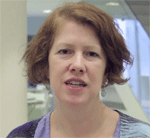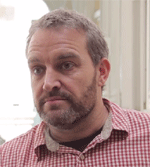Social Watch E-Newsletter - Issue 167 - May 9, 2014
Published on Fri, 2014-05-09 11:24
 |
| Issue 167 - May 9, 2014 |
|
|
|
|
| |
|
| |
Monitoring and accountability: Voices of the "watchers"
|
| |
|
| |
The participants in the civil society strategy meeting on monitoring and accountability organized by Social Watch last february in Montevideo were asked about how they personally work and relate with the huge task of making the powerful accountable. Here is what they said:
|
| |
|
| |

Kate McInturff.
|
Kate McInturff
I work in the project "making women count" which is focus on public policies that increase gender equality. What I do there and also in Social Watch has to do with public financing and looking at the economic and social policies that are empower to close the gap on gender budgeting between men and women in social economic policies. See the video here.
|
| |
|
| |

Martin Kirk.
|
Martin Kirk
Why inequality exists and why poverty exists? It is created by certain rules and structures so things like tax haven system takes huge amount of money out of the public budget around the world increases corporatization of any global institution, including the UN and the World Bank. What we are saying is that increasing situation where economies are used to draw well into the hands of tiny little people that create inequality and huge amount of poverty.
See the video here.
|
| |
See all the videos here. More coming soon. |
| |
|
| |
|
| |
The first High-Level Meeting of the Global Partnership for Effective Development Cooperation took place from 15 to 16 April in Mexico-City. – A commentary on the results by Anne-Sophie Gindroz.
This 1st High-level Meeting of the Global Partnership on Effective Development Cooperation was meant to discuss the progress made so far in development co-operation and to anchor the Global Partnership in a post-2015 development framework.
From the perspective of civil society organisations (CSO), the mounting evidences of shrinking space for civil society are indicating that no progress were made from Busan in promoting an enabling environment «to maximize CSO contribution to development».Read more
|
|
| |
|
| |
|
| |
 |
After a decade of high growth in sub-Saharan Africa, it is time to ask: who benefits? Certainly growth has been accompanied by somepoverty reduction and some progress in health and education. But advances are inadequate compared to the wealth created. Worse still, income inequality is rising in too many countries.
A new report by Tax Justice Network-Africa and Christian Aid investigates income inequality in eight sub-Saharan African countries and asks whether their tax systems are working to narrow the gap between rich and poor.
The report has many worrying findings. In Nigeria, in 1986 the richest 10 per cent were 1.7 times wealthier than the poorest 40 per cent. By 2010, they were 3 times richer – a 75 per cent increase in the concentration of income. In Zambia, income inequality is now at its highest level since data began to be collected, while South Africa still has one of the highest levels of inequality in the world – and it’s growing. Read more
|
| |
|
|
|
| |
|
| Made possible thanks to the funding and support of Oxfam Novib and the Flemish North South Movement - 11.11.11. |
 |
| The contents of this publication are the sole responsibility of Social Watch and can in no way be taken to reflect the views of Oxfam Novib and the Coalition of the Flemish North South Movement - 11.11.11. |
|
|
|
SUSCRIBE TO OUR NEWSLETTER
Submit
|
